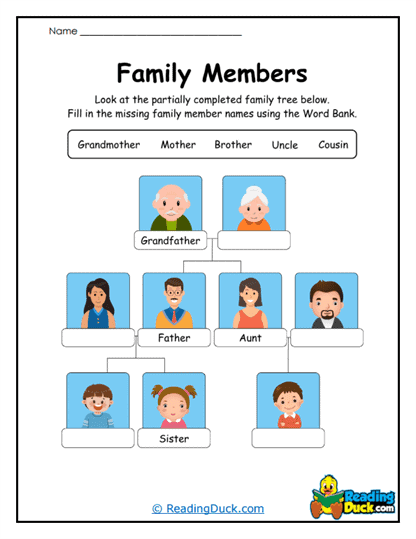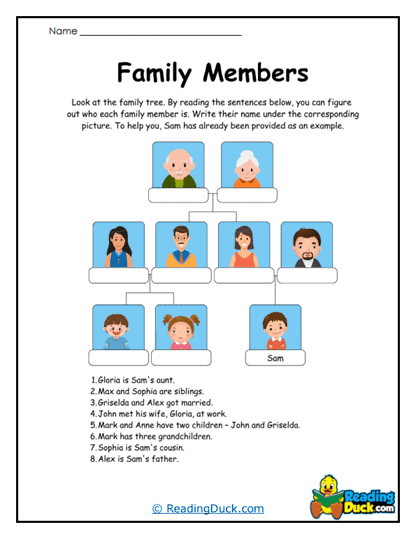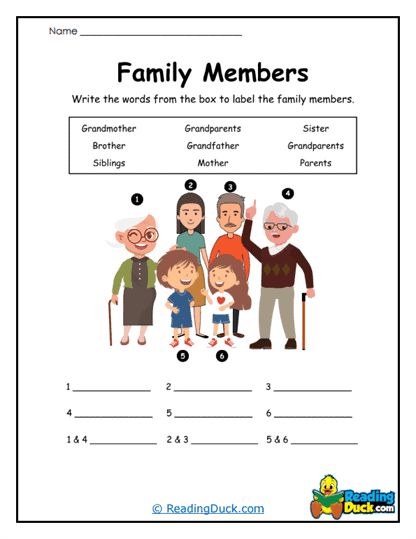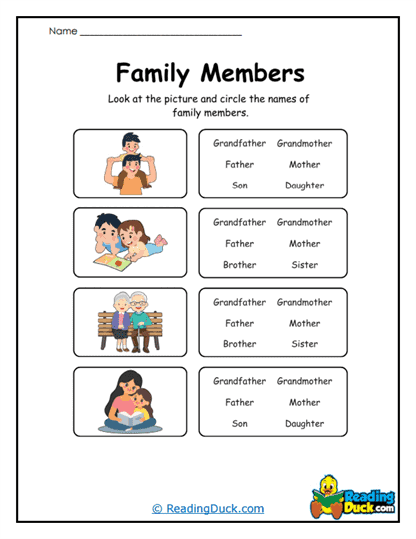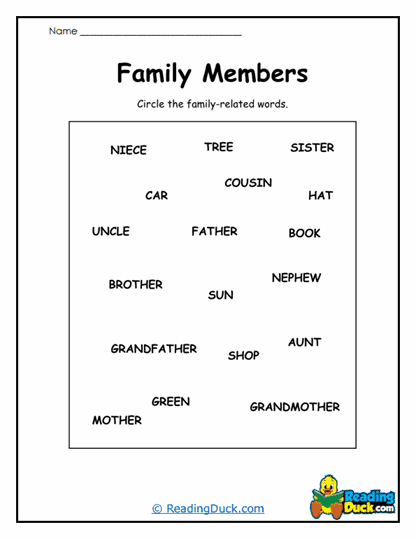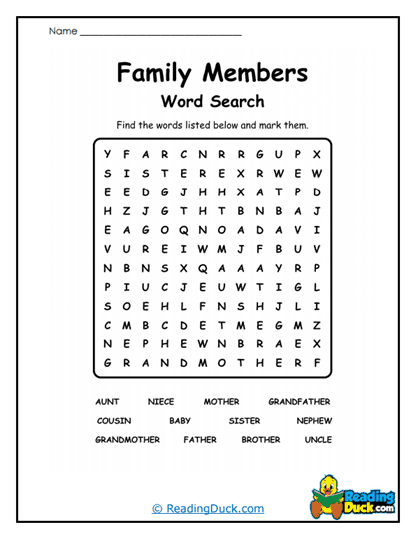Family Members Words Worksheets
About Our Family Members Vocabulary Words Worksheets
These worksheets will help you teach students about the vocabulary related to family relationships. These worksheets often include words like mother, father, sister, brother, grandparents, and other terms that describe familial connections. By incorporating these worksheets into lessons, educators and homeschoolers can help students develop a clear understanding of family-related vocabulary, improving their language skills and fostering comprehension of basic concepts. These materials are particularly beneficial for younger learners, English Language Learners (ELL), or students developing foundational literacy skills.
For teachers and homeschoolers, Family Members Vocabulary Words Worksheets serve as versatile learning aids. They can be used in a variety of contexts, from introducing vocabulary through visual aids and matching activities to reinforcing learning with word searches, fill-in-the-blank exercises, and sentence construction tasks. For example, students might be asked to match pictures of family members to their corresponding vocabulary words or to complete sentences like, My ____ is my mother's brother. These interactive and engaging activities keep students motivated while also promoting active learning.
In addition to vocabulary development, these worksheets support broader language and cognitive skills. Students practice reading, spelling, and writing while learning family terms in context. For younger students, the worksheets help with letter recognition and phonics, while older students may engage with more complex tasks, such as defining family roles or writing short paragraphs about their families. By connecting vocabulary learning to real-world concepts, these worksheets also foster critical thinking and encourage students to reflect on their own family structures.
Homeschoolers, in particular, may find these worksheets to be a valuable resource because they can be tailored to suit individual learning paces and family dynamics. For example, a homeschool parent can personalize the worksheets to include words like "stepfather" or "aunt" to reflect the student’s own experiences. These worksheets can be part of a broader language arts curriculum or integrated into social studies lessons to explore cultural and familial traditions, making them a flexible and adaptable teaching tool.
Teachers and homeschoolers can also use Family Members Vocabulary Words Worksheets to foster discussions about family roles, values, and diversity. By including examples from different cultural or family structures-such as single-parent families, extended families, or families with adopted members-educators can create an inclusive environment that celebrates diversity. This approach not only teaches vocabulary but also promotes empathy, understanding, and respect among students.
Common Family Members Vocabulary Words
Mother - A mother is a female parent who gives birth to or raises a child. She provides care, love, and support, playing a key role in a child's upbringing. Mothers can also be called "mom," "mommy," or similar affectionate terms.
Father - A father is a male parent who helps raise and support a child. He often provides guidance, protection, and care for his family. Fathers are commonly referred to as "dad," "daddy," or other affectionate names.
Brother - A brother is a male sibling who shares one or both parents with another child. Brothers often grow up together and form strong bonds through shared experiences. They can be younger, older, or twins.
Sister - A sister is a female sibling who shares one or both parents with another child. Sisters often play important roles in each other's lives as friends, mentors, or companions. They can be younger, older, or twins.
Grandmother - A grandmother is the mother of one’s parent, making her part of an extended family. Grandmothers are often seen as wise, loving figures who share stories and traditions with younger generations. They are sometimes called "grandma" or "nana."
Grandfather - A grandfather is the father of one’s parent and an elder member of the family. Grandfathers often offer wisdom, life lessons, and family history to younger relatives. Affectionate terms for a grandfather include "grandpa" or "papa."
Aunt - An aunt is the sister of one’s parent or the wife of one’s uncle. Aunts often play nurturing roles, spending time with nieces and nephews and offering additional family support. They can also be a source of fun and advice.
Uncle - An uncle is the brother of one’s parent or the husband of one’s aunt. Uncles may serve as role models, companions, or mentors to nieces and nephews. They are often involved in family events and traditions.
Cousin - A cousin is the child of one’s aunt or uncle, making them part of an extended family. Cousins often grow up playing together and can form close friendships. They are considered equal in generational status within the family tree.
Niece - A niece is the daughter of one’s sibling or sibling-in-law. She is part of the extended family and can be younger or older than the person referring to her. Many people enjoy a nurturing or mentoring role with their nieces.
Nephew - A nephew is the son of one’s sibling or sibling-in-law. Like a niece, a nephew is part of the extended family and may have close relationships with aunts or uncles. He may receive care, support, and guidance from these relatives.
Stepfather - A stepfather is the husband of one’s mother but not a biological parent. He often takes on a parental role and contributes to raising and caring for stepchildren. Step relationships can be strong and loving, forming blended families.
Stepmother - A stepmother is the wife of one’s father but not a biological parent. She may play a significant role in caring for stepchildren and helping to create a supportive family environment. Stepmothers are part of blended families, which combine biological and step-relatives.
Sibling - A sibling refers to a brother or sister, someone who shares one or both parents. Siblings often share childhood experiences, family traditions, and close bonds. They play important roles in each other's lives as family members and companions.
